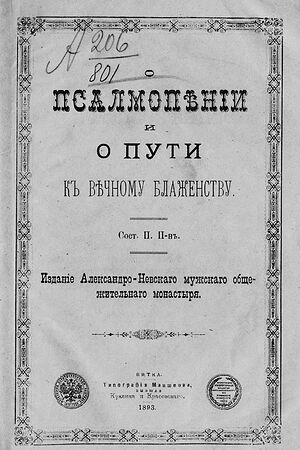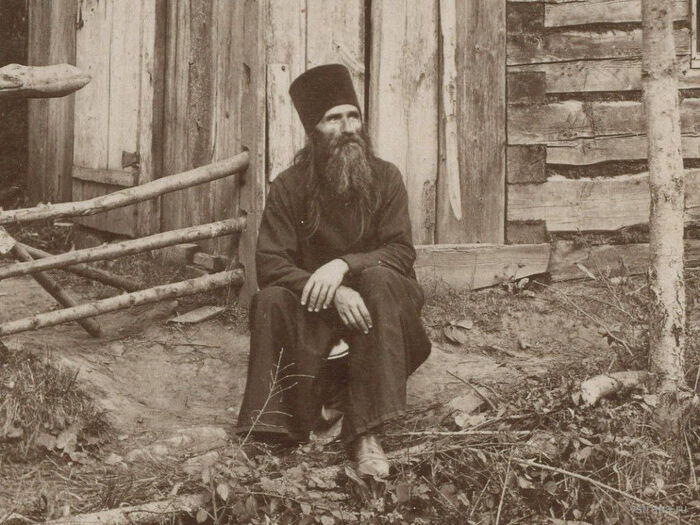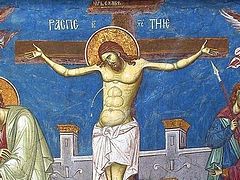St. Stephan of Fileika on the importance and role of Christian virtues in attaining salvation
The general Patristic approach to battling with specific sinful passions includes not only the desire to cut off the occasions for a passion to emerge, but also forcing oneself to plant the opposing virtue in his soul.
Fr. Stephan repeatedly exhorts his readers with the words of the Apostle, to reflect upon whatsoever things are true, God-loving, and virtuous (cf. Phil. 4:8). He teaches that when a man comes to know the truth of Christ, then all earthly things are as nothing for him. Such a man completely “adheres only to the law of the Lord.” This is the main foundation of a virtuous life, “so the soul would not cling to the earth … to have the heart and mind fixed on God.” These words can be deemed the main idea of St. Stephan’s spiritual heritage, as this thought runs like a thread throughout all his writings. From the list of the virtues especially mentioned by St. Stephan, we will focus on the following list, to which he attaches special importance: love, the remembrance of death, the fear of God, godly sorrow, humility, patience, chastity, and the courage not to leave the path of the salvation of the soul once begun.
Separately, we will note the virtues of mercy and non-condemnation, to which the saint devoted separate writings. It is these virtues, according to Fr. Stephan, that not only help a man overcome certain carnal and spiritual passions, but also lead him to renounce the world, to wholeheartedly strive for the Heavenly, and consequently, for the salvation of the soul. At the same time, we also note that according to the saint, the hope and foundation of every virtue is Christ Himself. Conversely, imaginary righteousness is “always connected with hope in oneself and with the cold confession of the Savior.”
The remembrance of death
The remembrance of death is an important component of the spiritual life. The essence of this virtue, according to St. Stephan, consists in the constant remembrance and anticipation of death, and of the subsequent judgment of God. According to the teaching of St. Stephan, it was by the remembrance of death that the first man was restrained from the fall, and it was only in rejecting it that he fell. The memory of death is necessary, “for the remembrance of death compels every man to submit to God, to live a holy life, pleasing to God.” The saint teaches that the presence of the remembrance of death alone allows a Christian to avoid being seduced by earthly goods and not be deceived by the world with all its lusts. Not only the teachings of the saint are dedicated to the remembrance of death, but also several verses he wrote referring to the memory of death to call the reader to repentance.
The fear of God
Fr. Stephan attaches key importance to the fear of God, which, on the one hand, is the most important component of the spiritual life, and on the other—a means of acquiring perfect love for God and meekness and humility, without which man cannot find salvation.
In his works, St. Stephan mentions the imperfect fear of God, in which a man is attracted to God by fear of punishment. This fear is born “from faith in the words of the Lord threatening the destruction of all unrepentant sinners. Although there is torment in the fear of God (cf. 1 Jn. 4:18), it serves unto salvation.” St. Stephan notes that a man who has acquired the fear of God will be surprised by worldly people, who, not understanding the ruinousness of their path, remain careless and calm in spirit.
Without speaking directly about the perfect degree of the fear of God, St. Stephan nevertheless speaks of some of its fruits. So, subsequently, if a man does not deviate from the path of pleasing God, such fear brings him the peaceful fruit of righteousness (Heb. 12:11), the essence of which, according to Fr. Stephan, is not only in spiritual peace, but also in the feeling of the blessed joy of salvation. It’s noteworthy that the saint illustrates this by referring to St. Seraphim of Sarov, who before his repose felt a special blessed joy about his salvation.
The fear of the Lord not only purifies the soul of a man from all sins and leads it into the love of God, but also completely deprives it of natural fear, because “the fear of God is stronger than any other fear… On the contrary, whoever has not learned the fear of the Lord is afraid of everything except God.” It should be noted that the saint writes about the fear of God in many of his writings, because, according to him, it is this virtue that allows a man to be firmly rooted on the path of salvation.
Godly sorrow
From the fear of God, godly sorrow is born in a man (2 Cor. 7:10)—a virtue that “produces care for how to please God, and serves for the salvation of the soul.” Elder Stephan wrote about this many times. Note that godly sorrow, along with the fear of God, is the first sign that a man has embarked upon the narrow path of salvation.
Godly sorrow is the opposite of worldly sorrow, the root of which lies in caring for everything earthly and temporal. The awareness of the weakness of our will for serving God is also a source of godly sorrow. When we are in sorrow for our salvation, then we will know that the Lord has determined us … to receive salvation (1 Thess. 5:9). Whoever has found “heartfelt sorrow for his sins is in repentance and walks the narrow path to eternal joy,” teaches Fr. Stephan. Note that this virtue is the focus of his poetic works, by means of which he encourages his listeners to turn to Christ.
Humility
The sorrow of realizing the ruinousness of one’s position and weakness of will leads a man to humility, which, in turn, gives birth to “blessed weeping” in a man. According to the saint’s word and personal experience, tears become oil and a life-giving salve for the wounds of sin upon the soul. The soul of such a man is filled with tenderness from this grace-filled softening and enlightenment.
Another cause of blessed weeping and means for salvation is humility, which St. Stephan defines as submission to God. Consequently, consolation is given to the soul not because of external labors, but because of humility alone. Here we also see a consonance with the teachings of the Holy Fathers. As Professor S. M. Zarin notes with reference to the Holy Fathers, reward is given for humility, not for deed. An indicator of the quality of a man’s spiritual life is the presence of humility in him.
Deeper inner humility is attained through bodily humility, the essence of which is extreme non-possessiveness or poverty, detachment from worldly cares, and “a kind of wandering life.” The presence in a man of a contrite and humble heart and a fervent desire for pleasing God are signs of a man’s spiritual renewal. External labors and asceticism without inner humility do not bring a man nearer to God, inasmuch as “the Lord is looking for the inner correction” of man. That is why the Lord reveals the knowledge of His secrets only to the humble and the meek.
The core of humility is “awareness of sins and repentance,” and therefore humility can be so deep that a man not only does not resent insults and temptations from people, but also “considers it of great benefit to himself to be oppressed and offended.”
True repentance consists in heartfelt contrition for one’s sins. Repentance “is a sighing cry for mercy, a heartfelt petition for forgiveness of sins and spiritual suffering, constant self-abasement, and voluntary self-condemnation to anguish and sorrow,” teaches Fr. Stephan.
Endurance of sorrows
A necessary and important means of acquiring humility, inner contrition, and accordingly, repentance, is the endurance of various sorrows. Sorrows are not always a direct consequence of a sinful life and the unwillingness to walk the path of fulfilling the will of God. Enduring sorrows should be associated with godly sorrow—only this way will a man be able to see the providence of the right hand of God for him and understand the true meaning of the sorrows sent to him. St. Stephan touches on the theme of suffering and tragedies in basically all of his writings.
The saint gives the following reasons for why the Lord allows sorrows. First, to humble the arrogant heart of man who through awareness and contemplation of his infirmity will be able to humble himself and receive grace. Second, so man might acquire virtue and, in particular, learn patience and generosity, without which there can be no firm foundation for the spiritual life. Third, that through sorrows man might be co-crucified with Christ and thereby be accounted worthy of the great mercy of God and through this receive a great reward in the Kingdom of Heaven. Fourth, that man might become unattached to things earthly and turn his gaze to the eternal, because only sorrows give man an awareness of the impermanence of this life. Fifth, according to the completely ineffable judgments of God for the salvation of the soul, the Lord can allow sorrows. Sixth, for a man to be strengthened in faith and hope in God. Seventh, to lead man into an awareness of his former sins. Thus, “sorrows, persecutions, and various animosities serve as guides to the Kingdom of Heaven for us,” concludes Fr. Stephan.
Chastity
A specific theme in the writings of St. Stephan is chastity, as it is impossible to reach Christ except by a chaste and righteous life. He has an entire essay, “How a Young Man Can Keep His Way Pure,” dedicated to the examination of this virtue. In it the saint praises and magnifies virginity, calling it the direct path by which we can offer fruit to God a hundredfold. But at the same time, Fr. Stephan doesn’t exclude that a Christian can be saved and serve God in family life. He teaches that “the Christian life in the world and the raising of children in faith and piety is one of the paths of service to God.” St. Stephan is in harmony here with, for example, St. Theophan the Recluse, who taught that a man can attain salvation in any place and in any situation. This thought is very important in the context of modern times, when you often hear among the faithful and some spiritual fathers about the exclusivity of the monastic path for the salvation of the soul.
Courage
According to St. Stephan, a perfect Christian should constantly be in search of the Kingdom of God; that is, he must do everything possible to submit to the will of God, to preserve the devotion of his mind and heart to God. Only in this way can he acquire the fullness of the virtues—love, joy, peace, longsuffering, meekness, temperance (Gal. 5:22-23). These are those fruits without which a Christian will be a “fruitless tree.” At the same time, speaking of the heights of the spiritual life, St. Stephan repeatedly inspires the reader not to be faint-hearted in gazing upon his infirmities, but to have the courage not to abandon the labor of the salvation of the soul once begun. Using the example of the saints who had many serious falls in their lives, the saint calls man not to be despondent, but “to labor at least a little for the Lord’s sake, and endure sorrows and the deprivation of temporal goods.” The main thing is that a man wants to be delivered from sins and submit his heart to Christ. Thus, each man has hope of salvation, of ascension to the heights of the virtuous Christian life.
Mercy
St. Stephan repeatedly mentions the virtue of mercy in his works as spiritual fruit that every Christian should bear. He indicates the significance of this virtue separately in his work, On Covetousness and Charity. The desire to acquire wealth, which the saint, following the Apostle, calls idolatry (cf. Eph. 5:5), is contrasted with works of mercy and care for the poor and needy.
At the same time, Fr. Stephan denounces not only the desire for gain, but also being overly concerned about earthly things when a man forgets about God. Here we see a parallel with St. Theophan the Recluse’s work, Path to Salvation, in which, psychologically precisely describing the portrait of a sinner, he speaks of man who can’t see God beyond his earthly care, and doesn’t bring forth any good spiritual fruit, and, as a result, perishes. The counterbalance to such a life is one full of compassion, mercy, and carrying for one’s neighbor, according to St. Stephan. He repeatedly draws attention to the fact that we must see Christ in everyone who is in need. It’s important to note that the virtue of mercy can be considered as such only when it’s done “for the sake of the Gospel and obedience to Jesus Christ.” At the same time, mercy is not limited to material alms, but includes a meek and courteous attitude towards the poor. In this work, he constantly reproaches wealthy people who neglect the needy, which exposes the social problem that existed in the saint’s time.
Non-condemnation
Fr. Stephan dedicates a separate work to this theme, in which he describes non-condemnation as “the easiest path to salvation.” The foundation for acquiring this virtue is the desire to see our sins and consider none as unworthy of the mercy of God, and the desire to learn “silence for the sake of the salvation of the soul”—the second part of his work, On Non-Condemnation, is dedicated to this latter point.
Love
 One of the works of St. Stephan The crown of the virtuous life is, according to St. Stephan, the virtue of love. It is love that most of all likens man to God. Love, according to the saint, is “the main property of the human soul.” It is precisely through love that man can most of all become like God, Who is good to all; therefore, the one who loves God will love all his neighbors and will, as much as possible, do good not only to the good, but also to evil people. And it is only through the prism of love for God that man can truly come to love others, and conversely, love for any person to the detriment of love for God drives a Christian to destruction. He who has acquired perfect love for God is no longer “despondent in spirit, nor thinks evil, nor exalts himself, but humbles himself and is pacified, and ever rejoices in the Lord in his heart.”
One of the works of St. Stephan The crown of the virtuous life is, according to St. Stephan, the virtue of love. It is love that most of all likens man to God. Love, according to the saint, is “the main property of the human soul.” It is precisely through love that man can most of all become like God, Who is good to all; therefore, the one who loves God will love all his neighbors and will, as much as possible, do good not only to the good, but also to evil people. And it is only through the prism of love for God that man can truly come to love others, and conversely, love for any person to the detriment of love for God drives a Christian to destruction. He who has acquired perfect love for God is no longer “despondent in spirit, nor thinks evil, nor exalts himself, but humbles himself and is pacified, and ever rejoices in the Lord in his heart.”
The love of acquiring earthly goods is incompatible with love for God. But the Lord, while demanding perfect devotion from man, respects his freedom of choice, allowing him, like the rich young man, to depart (cf. Mk. 10:22).
It should be noted that St. Stephan singles out love for enemies as a separate virtue. He likens this love for those who hate us to a sacrifice to God, which makes us His true sons and friends and is “the strongest victory over the enemy [of our salvation].”








